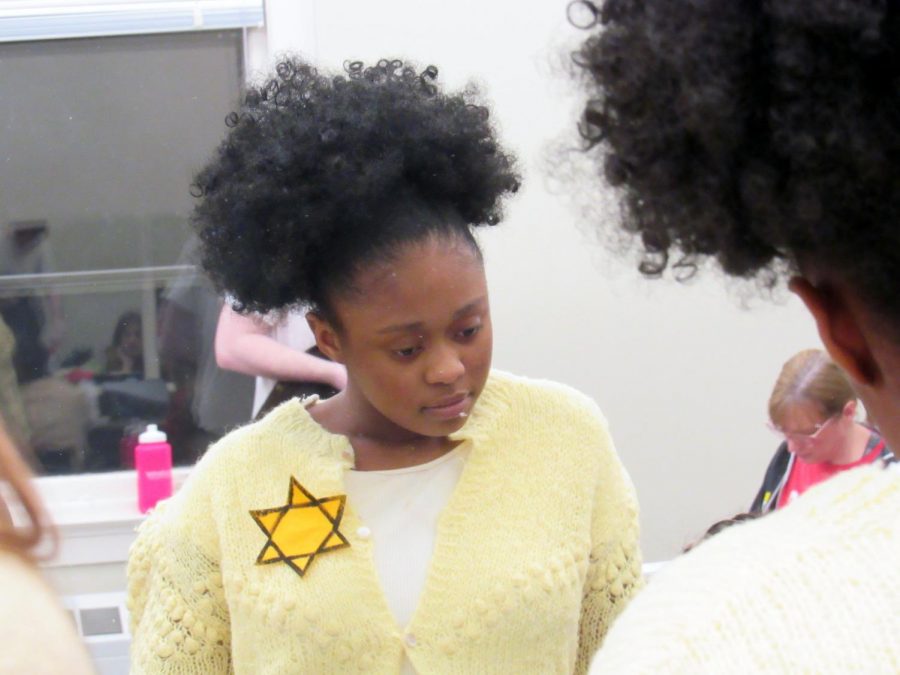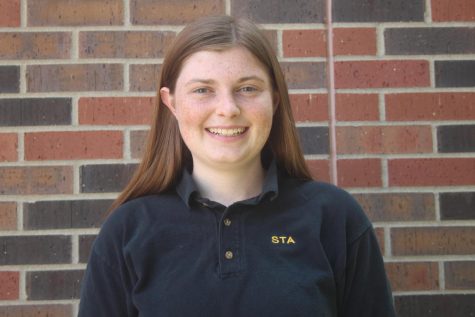Letters to Sala brings a true story to life
This year’s play Letters to Sala gives the cast a chance to explore characters in German labor camps.
February 14, 2019
The music surrounds senior Lauren Daugherty and her castmates right before the big show. As she stands, they begin to sing to each song together. They move freely to the sound of the music, releasing all of their nerves and thoughts about what might go wrong on stage.
Daugherty does this each night before a performance in order to get rid of the nerves building inside her. Dancing before each show makes her feel as though the performance will go perfectly once she steps out onto the brightly lit stage. This year Daugherty will dance before performing in the latest play entitled Letters to Sala running Feb. 13-16.
The show is a true story about a girl named Sala who goes to a labor camp Oct. 28, 1940 at the age of 16 in order to save her sister from going. The play revolves around letters that she receives during her time in the camp. However, she and the others in the camp weren’t allowed to keep the letters, and she must hide them under her mattress for years. The story is based off of a book named Sala’s Gift written by Ann Kirschner, Sala’s daughter.
Throughout the play, the audience sees moments of what Sala’s life is like years after surviving the labor camp.
“Old Sala is about to go into surgery and she’s worried that she’s not going to come back from it, so she brings out this box which is filled with all of these letters,” Daugherty said. “She gives them to her daughter Ann who helped get people to keep records of all of this stuff that she got from her mother. Present Sala is obviously reflecting on all of this past that was so difficult.”
Part of the reason theater teacher Shana Prentiss chose this play revolved around educational aspects. She wanted all of her students to know the importance of the Holocaust and the impact that word can have.
“I learned through talking to students last year, especially freshmen, how many students really didn’t know what happened during the Holocaust,” Prentiss said. “I had students that said ‘I don’t know what a Swastika is. I had to look it up.’ As an educator, I was very surprised by that, and I know that as they go through St. Teresa’s, they get that education, but I thought this is an area where I can maybe help.”
Ignorance surrounding the Holocaust was shocking to some students as well because their performances for the play are very emotional and difficult to handle sometimes. Sophomore Elie Roddy plays Sala’s mentor named Ala Gertner, and playing a real person has made her feel a lot of sympathy for what the characters go through in the labor camps.
“I think it’s important for people to come and watch because you can hear and read about things, but you don’t fully get the empathy than when you actually see the people on stage and feel what they’re going through,” Roddy said. “We cry every day because the story is so awful.”
The play is not only made difficult by the emotional component but also the actors’ accents throughout the play. There’s a mixture of Polish, German and also American accents that the cast has been practicing for weeks. Although the original production did not use accents, Prentiss decided to have them for clarity in different scenes, but they did have the help of sophomore Darcie Hingula’s grandmother.
“It’s difficult for actors to really get into the headspace [of the characters], and a lot of us have been struggling with [accents],” Roddy said. “We talked to Darcy Hingula’s grandma who is from Poland. We sat down, and she talked to us for a while and we just listened to her as she read some of the script. And it was really helpful.”
Prentiss believes that if someone with a personal connection to the Holocaust were to come see the play it might be difficult due to the symbols and dialogue used. She’s aware how hurtful it may be for some, and they’re trying to be as respectful as possible about the audience’s feelings.
“I feel a huge responsibility in telling this story, and I broke out into tears at rehearsal talking about it,” Prentiss said. “It’s incredibly emotional, and I wake up at four in the morning thinking about the best way to tell this story. I would also say to people be aware that we have German guards in the production, so they are wearing the German uniform which involves Swastikas. We’re trying to be as respectful as we can with that because of the history of that symbol, but the first time those kids put those uniforms on is going to be very difficult.”
Many aspects of the play are difficult for the cast, but Prentiss believes that there is a bright side to this year’s play as many different people who have never participated in theater before decided to come and try out.
“I am always so excited when we have new faces that show up, and we really try to get new people involved,” Prentiss said. “I love having those opportunities. We have so many talented kids at St. Teresa’s. They just have to show up for the audition, and hopefully I have something that’s right for them. But keep coming and keep showing up.”
Daugherty believes that each cast member, old and new alike, is working so hard on telling the story in the right way. It’s important to her that a lot of people come in order to learn something from the story.
“Plays are so underrepresented, and there’s no singing so people are like ‘eh’,” Daugherty said. “The difference between the crowds is astounding to me every single time because for musicals they’re always filled to the top. And this play tells such a beautiful story, and what’s crazy is it’s all so true. The real Sala died around last March. It’s very heart-wrenching, and I even cry when I’m just on stage sometimes. It’s about learning not to be judgmental and opening your eyes to the reality of the world that we’re in. It’s unfortunately not that different from the world that they lived in.”




